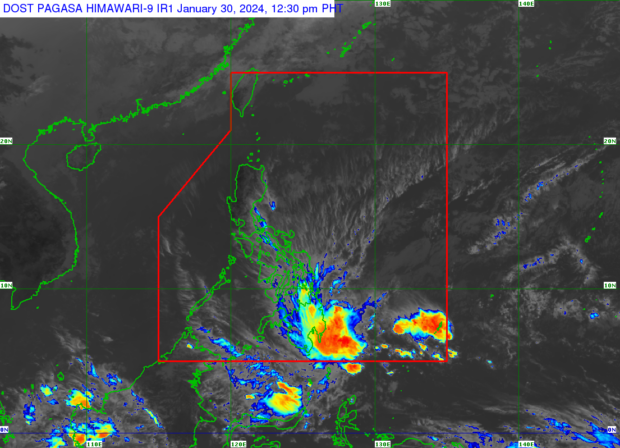
The Philippine Atmospheric, Geophysical and Astronomical Services Administration (Pagasa) says that parts of Mindanao will see a “significant” volume of rain on Tuesday, January 30, 2024, because of the trough or extension of a low-pressure area (LPA). Photo from Pagasa
MANILA, Philippines — The Philippine Atmospheric, Geophysical and Astronomical Services Administration (Pagasa) advised residents to brace for a “significant” volume of rain over various parts of Mindanao on Tuesday because of the trough or extension of a low-pressure area (LPA).
In an 11 a.m. weather advisory, Pagasa said the LPA’s trough is forecast to trigger 50 to 200 millimeters of rain in the following areas:
- Davao de Oro
- Davao Oriental
- Surigao del Sur
- Dinagat Islands
- Surigao del Norte
- Agusan del Norte
- Agusan del Sur
- Davao City
- Davao del Norte
- Davao del Sur
- Davao Occidental
- Misamis Oriental
- Bukidnon
“Under these conditions, flooding and rain-induced landslides are possible,” the state weather agency warned.
READ: Chilly weather stays in parts of PH due to northeast monsoon
Pagasa likewise raised a heavy rainfall alert over six provinces in Mindanao.
At 10:30 a.m., a Red Rainfall Advisory was issued for Agusan del Sur, Davao de Oro, Davao Oriental, and Surigao del Sur.
An Orange Rainfall Advisory was hoisted for Davao del Norte, while a Yellow Rainfall Advisory was issued for Surigao del Norte.
According to Pagasa, a Red Rainfall Advisory is issued over an area when precipitation is anticipated to exceed 30 mm within one hour or if continuous showers over the past three hours have already reached more than 65 mm.
An Orange Rainfall Warning is issued when observed rainfall ranges between 15 mm and 30 mm within one hour, while a Yellow Rainfall Advisory is raised when the expected rainfall amount ranges between 7.5 mm and 15 mm within one hour, Pagasa further explained.
Pagasa specialist Grace Castañeda, however, said during an early Tuesday morning weather report that the LPA spotted south of Mindanao and outside of the Philippine area of responsibility (PAR) is unlikely to intensify into a cyclone or enter the PAR.